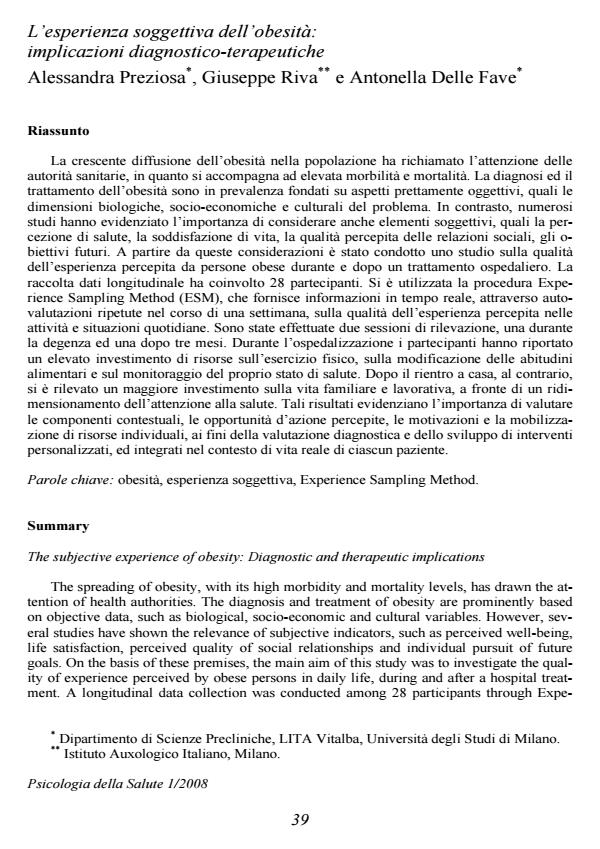L’esperienza soggettiva dell’obesità: implicazioni diagnostico-terapeutiche
Journal title PSICOLOGIA DELLA SALUTE
Author/s Alessandra Preziosa, Giuseppe Riva, Antonella Delle Fave
Publishing Year 2008 Issue 2008/1
Language Italian Pages 17 P. 39-55 File size 227 KB
DOI
DOI is like a bar code for intellectual property: to have more infomation
click here
Below, you can see the article first page
If you want to buy this article in PDF format, you can do it, following the instructions to buy download credits

FrancoAngeli is member of Publishers International Linking Association, Inc (PILA), a not-for-profit association which run the CrossRef service enabling links to and from online scholarly content.
L’esperienza soggettiva dell’obesità: implicazioni diagnostico-terapeutiche - The subjective experience of obesity: Diagnostic and therapeutic implications The spreading of obesity, with its high morbidity and mortality levels, has drawn the attention of health authorities. The diagnosis and treatment of obesity are prominently based on objective data, such as biological, socio-economic and cultural variables. However, several studies have shown the relevance of subjective indicators, such as perceived well-being, life satisfaction, perceived quality of social relationships and individual pursuit of future goals. On the basis of these premises, the main aim of this study was to investigate the quality of experience perceived by obese persons in daily life, during and after a hospital treatment. A longitudinal data collection was conducted among 28 participants through Expe-rience Sampling Method (ESM). This procedure provides repeated on-line sampling of the subjective experience associated with daily life situations and activities for one week. Participants were followed during two sampling sessions: the first took place during the hospital treatment; the second one was conducted three months later. During the treatment participants were prominently focused on their health conditions, on the practice of physical exercises and on the change in eating habits. After coming back home, their investment on food habits and health dramatically decreased, in favour of a growing attention to family, work and relational issues. These results suggest that the development of effective intervention should take into account patients’ behavior and perception of the environmental opportunities in the daily context, in order to promote the long-term stability of treatment outcomes. Key words: obesity, subjective experience, Experience Sampling Method.
Alessandra Preziosa, Giuseppe Riva, Antonella Delle Fave, L’esperienza soggettiva dell’obesità: implicazioni diagnostico-terapeutiche in "PSICOLOGIA DELLA SALUTE" 1/2008, pp 39-55, DOI: